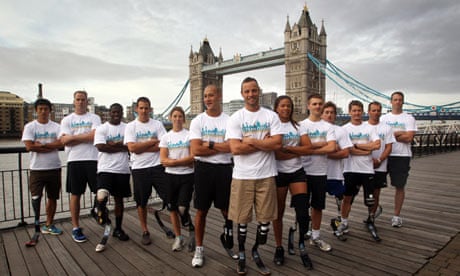Oscar Pistorius made history as an Olympian today, three weeks before the London 2012 Olympic Games opening ceremony. He made history because as a Paralympian running with prosthetic carbon fibre limbs, he beat able-bodied competitors to a place in the South African 4x400 metres relay team.
As being overtaken in the egg and spoon race has taught many a four-year-old, in sport, it's rarely the taking part that counts. Athletes are winners, or at least they aim to be. Any sprinter grinning at fourth place is missing the point.
Pistorius will be no different. No one gets to be world class at anything without a cut-throat drive to be the best. This drive is arguably even more intense in someone whose legs have been amputated before his first birthday. But it's not really patronising to say that this case is an exceptional one: it is, at least partly, about the taking part. Pistorius will rightly want a gold medal, not a "well done for trying" medal and Kate Middleton patting him on the head. But there's an undoubted achievement simply in the inclusion of a disabled person in the Olympic competition.
For most people with disabilities, inclusion is the shiny medal they spend their lives fighting for but which stays slightly out of reach. This isn't new. It's the nature of being different. It is worsening though, and in the current climate, without radical change, there is little hope of it getting better.
It shouldn't be that difficult, should it? For a person to be included? Sometimes it seems difference is a crime for which disabled people are punished daily. One aspect of this will feature on the route to the Games themselves – Paralympians being welcomed to a city whose transport system is usually inaccessible to them.
Exclusion is sneaky though, it doesn't even need to be literal. Thanks to David Cameron and friends, disabled people are facing not only physical barriers but growing symbolic exclusion.
This is what a climate of fear does – a climate that doesn't simply emerge from tough economic times but needs to be manipulated and nurtured. It's manipulated by a government that thinks welfare reform means arbitrarily removing vulnerable people's benefits. It's nurtured by a rightwing populist press eager for benefits-cheats scapegoats and scaremongering.
This is a climate in which a website needs to be created to collate the number of people committing suicide as a result of the government's policies. Calum's List details the deaths of people where either professional or family testimony, or a suicide note cites welfare reform as the main reason for their taking their own life. A climate in which the number of disability hate crimes reported to the police has reached a record high . A total of 1,942 were recorded by forces in England, Wales and Northern Ireland last year – a 14% increase on those for 2010.When Pistorius, the "Blade Runner", comes to the Olympics, he'll have achieved true inclusion – a disabled athlete competing on equal terms next to the able-bodied.
Inclusion though, rarely takes this form. Pistorius is part of an elite. For most of us, it's just about having a job, being respected in the street, being given help if you need it to get out of the house. It's ordinary and everyday – and that's part of its beauty.
As the crowds cheer, the people of this country would do well to think on that sentiment. A disabled person shouldn't have to be "super-able" to be included.
Having been allowed to join the mainstream, Pistorius can strive to rise above it. For the ordinary disabled person, it would be nice to be allowed to take part.

